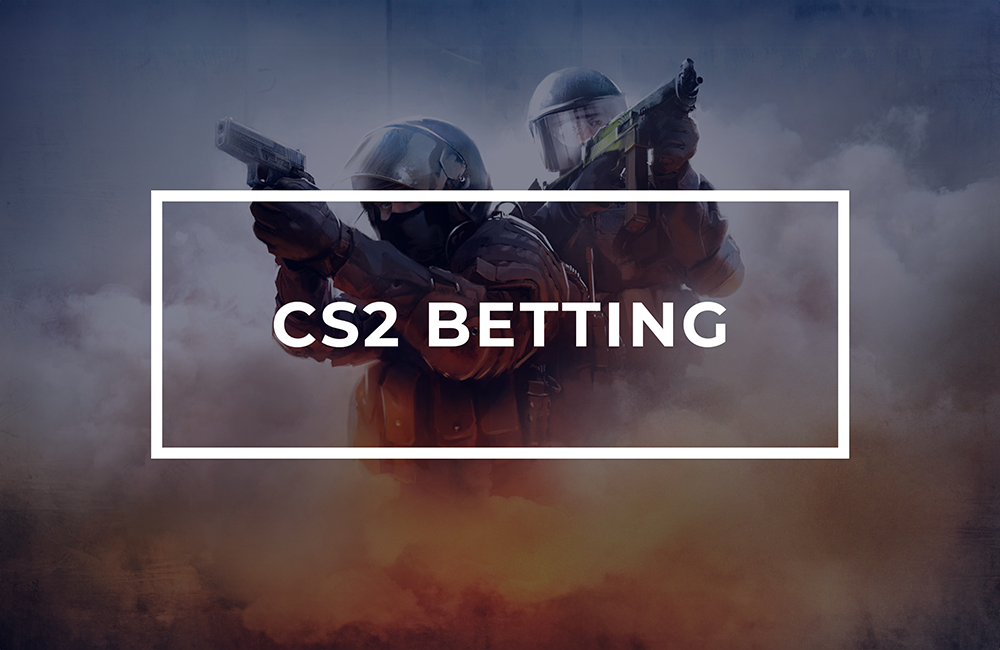Counter-Strike 2 (CS2) is one of the most popular and competitive esports titles in the world, offering a dynamic and strategic gameplay experience that attracts millions of viewers and bettors alike. Betting on CS2 can be both thrilling and profitable if you understand the game, the teams, and the various betting markets available. This guide will provide you with everything you need to know to get started and succeed in betting on CS2.
1. Understanding the Basics of CS2 Betting
1.1 What Is CS2 Betting?
CS2 betting involves placing a wager on the outcome of a Counter-Strike 2 match or specific events within the match. The objective is to predict the outcome correctly to win money. CS2, as a tactical first-person shooter, requires players to rely on strategy, teamwork, and individual skill, all of which play a significant role in determining the outcome of matches.
Betting on CS2 has grown alongside the esports industry, with a wide range of markets now available, including match winners, map winners, and specific in-game events. Understanding the game mechanics, team dynamics, and current meta are crucial for making informed bets.
1.2 How Odds Work
Odds are a fundamental aspect of betting, representing the probability of a particular outcome and determining potential winnings. Understanding how odds work is crucial for making informed bets.
- Decimal Odds: Common in Europe and Canada, decimal odds are straightforward. For example, if the odds are 2.50 and you bet $10, your total payout would be $25 ($10 x 2.50), which includes your original stake.
- Fractional Odds: Common in the UK, fractional odds are shown as fractions, such as 3/1. This means for every $1 you bet, you could win $3 in profit.
- American Odds: Primarily used in the United States, American odds can be positive (e.g., +250) or negative (e.g., -150). Positive odds indicate how much you would win on a $100 bet, while negative odds show how much you need to bet to win $100.
1.3 Types of Bets
There are several types of bets you can place on CS2, each offering different levels of risk and reward:
- Match Winner: The most straightforward bet, where you wager on which team will win the match. CS2 matches are typically played in a best-of-one, best-of-three, or best-of-five format, depending on the tournament.
- Map Winner: This bet involves predicting which team will win a specific map within the match. Some teams are stronger on certain maps, making this bet an excellent opportunity if you have detailed knowledge of the teams’ map preferences and strengths.
- Handicap Betting: In handicap betting, one team is given a virtual advantage or disadvantage to level the playing field. For example, in a best-of-three series, a -1.5 map handicap means the favored team must win 2-0 for the bet to be successful.
- Total Rounds (Over/Under): This bet involves wagering on whether the total number of rounds played on a map will be over or under a certain number set by the bookmaker. CS2 maps are won by the first team to reach 16 rounds (or more in the case of overtime), making this a popular bet when teams are closely matched.
- Pistol Round Winner: This bet focuses on the outcome of the first round of each half (known as the pistol round), which can set the tone for the rest of the match. Some teams have strong pistol round strategies, making this an interesting bet.
- First Kill: This bet involves predicting which team will get the first kill in a round. This can be highly unpredictable but offers a fun and fast-paced betting option, especially in rounds where one team is expected to dominate.
- Outright Winner: An outright bet involves predicting the winner of an entire tournament rather than just a single match. This requires a broader understanding of the teams involved and their performance across the event.
2. Advanced Betting Markets and Strategies
2.1 In-Play Betting
In-play or live betting allows you to place bets during the match, with odds fluctuating based on the action. This type of betting is particularly popular in CS2 due to the dynamic nature of the game, where rounds can be won or lost in a matter of seconds.
- CS2 In-Play Betting: In CS2, the momentum can shift rapidly due to clutch plays, economic factors, or strategic adjustments. Bettors need to stay engaged with the match and be ready to place bets based on how the game is unfolding. For example, if a team is known for strong comebacks, betting on them after they lose the first few rounds might offer value.
- Strategies: A common strategy in in-play betting is to bet on teams that are strong on the CT (Counter-Terrorist) side after they lose the first half as T (Terrorists), as the CT side is often seen as more favorable on many maps. Another strategy is to bet on the outcome of the next round based on the economy of each team, as teams with more money can afford better weapons and utility.
2.2 Map Betting
Map betting involves wagering on the outcome of individual maps within a match. This type of bet can be particularly lucrative if you have in-depth knowledge of the teams’ map strengths and weaknesses.
- Map Veto Process: Understanding the map veto process is crucial in map betting. Before each match, teams take turns banning and picking maps. The order in which maps are picked can give insights into which team might have the advantage. For example, if a team’s strongest map is left in the pool, they might be more likely to win that map.
- Map-Specific Strategies: Each map in CS2 has its unique layout, favoring different playstyles. Some teams excel on maps with long sightlines like Dust2, while others might perform better on more tactical maps like Inferno. Betting on a team to win their preferred map, even if they are the underdog overall, can be a smart move.
2.3 Player Props and Performance Betting
Player props focus on individual player performances rather than the outcome of the match. This type of betting is particularly popular in CS2, where star players can have a significant impact on the game.
- Top Fragger: This bet involves predicting which player will get the most kills in a match or on a specific map. Star players, or those known for their aggressive playstyles, are often good candidates for this bet.
- Headshots: Some bookmakers offer bets on the number of headshots a player will get during a match. Players with exceptional aim and those known for using precise weapons like the AK-47 are typically better bets for high headshot counts.
- Total Kills Over/Under: This bet involves wagering on whether a specific player will get over or under a certain number of kills during the match. Knowing a player’s role within the team (e.g., entry fragger, AWPer, support) can help you make an informed decision.
2.4 Tournament Betting
Betting on the outcome of entire tournaments offers different challenges and rewards compared to individual match betting.
- Outright Winner: Betting on the outright winner of a tournament requires a deep understanding of all participating teams, their recent form, and the tournament format. Some teams perform better in different formats (e.g., double-elimination vs. single-elimination), and understanding these nuances can give you an edge.
- Group Stage Betting: Many tournaments have group stages before the playoffs. Betting on group stage outcomes, such as which teams will advance or which will finish top of the group, can offer value if you have a good grasp of the teams’ relative strengths.
- MVP Betting: Some bookmakers offer bets on which player will be named the tournament MVP (Most Valuable Player). This requires predicting not only which team will perform well but also which player will stand out the most during the event.
3. Key Factors to Consider Before Placing a Bet
3.1 Team Form and Recent Performance
Understanding a team’s recent form and performance is crucial for making informed bets in CS2.
- Recent Matches: Analyze the results of the team’s recent matches, including who they played against and how they performed. Consider not just wins and losses but also the context of those matches—were they against top-tier teams or weaker opponents? Were the matches close, or were they dominant victories or defeats?
- Roster Changes: Roster changes can significantly impact a team’s performance. New players might take time to integrate, or they could immediately improve the team’s dynamics. Conversely, the loss of a key player can weaken a team’s chances, especially if the replacement is less experienced.
- Head-to-Head Record: Consider the head-to-head record between the teams. Some teams might have a psychological edge over others due to past victories or specific playstyle matchups. If one team consistently defeats another, this trend might continue unless there have been significant changes to either roster.
3.2 Map Pool Strength
A team’s map pool, or the maps they are strong on, is a critical factor in CS2 betting.
- Map Win Rates: Check each team’s win rates on different maps. A team might be strong overall but have weaknesses on certain maps. Conversely, an underdog might excel on a particular map, making them a good bet in a specific situation.
- Recent Map Performance: Even if a team historically performs well on a map, their recent performance might tell a different story. Look at how they’ve performed on the map in their most recent matches to get a sense of their current form.
- Map Vetos: Understanding the map veto process can give you an edge in predicting the outcome of matches. Teams often ban maps they are weak on and pick maps where they have a strong advantage. Knowing how the veto process might play out can help you anticipate which maps will be played and which team might have the upper hand.
3.3 Player Performance
Individual player performance can greatly influence the outcome of a CS2 match.
- Star Players: Identify the star players on each team and analyze their recent form. A single player can carry a team to victory with exceptional performances, especially in key moments such as clutch situations or important rounds.
- Roles and Synergy: Each player on a CS2 team has a specific role, such as entry fragger, support, or AWPer. Understanding these roles and how well the players perform in them can help you predict how a match might unfold. Teams with well-defined roles and good synergy are often more consistent.
- Health and Mental State: In esports, player health and mental state are critical. Long tournaments or personal issues can affect a player’s performance. Pay attention to any news about player fatigue, injuries, or other factors that might influence their performance.
3.4 Tournament Format and Pressure
The format of the tournament and the pressure of the competition can impact team performance.
- Best-of-One vs. Best-of-Three: Matches in different formats require different strategies. Best-of-one matches can lead to more upsets, as a single map loss results in defeat. Best-of-three and best-of-five formats are generally more reliable indicators of the stronger team, as they allow teams to recover from an early loss.
- Elimination Matches: In elimination matches, where a team faces elimination from the tournament if they lose, the pressure can significantly impact performance. Some teams thrive under pressure, while others might crumble. Understanding how a team historically performs in high-pressure situations can give you an edge in betting.
- Travel and Scheduling: Long travel schedules, jet lag, and tight match schedules can affect team performance. Teams that are used to international travel or have better resources for managing fatigue might perform better under these conditions.








